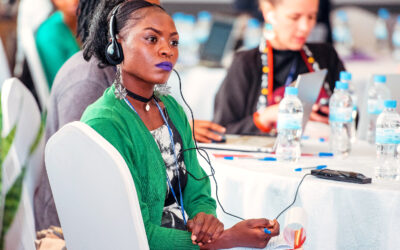There was a horrifying phrase in the news this week from Abubakar Shekau, the leader of Boko Haram in Nigeria, as he spoke about the girls his group has kidnapped.
“There is a market for selling humans,” he said.
He is right, and his comment unveils a terrible truth about the persistence of slavery. Too many people think slavery ended more than a century ago. Though outlawed, slavery continues in new forms, hidden from sight. What makes this incident in Nigeria different is that it is out in the open.
The unpardonable sin being committed Boko Haram should focus our attention on the fact that children are forced into modern-say slavery in nearly every country. Recent research estimates that there are 21 to 30 million people in slavery today, about 26 percent of them children. They are forced to work without pay, under threat of violence, and they cannot walk away. That’s millions of child sex slaves, child labor slaves and child slave brides. According to the Global Slavery Index, there are as many as 700,000 slaves in Nigeria alone.
We applaud the effort to rescue the captive girls and pray for success. Equal determination must be shown to end slavery everywhere once and for all. This means breaking the trade in humans. Rescues are only part of the story. Over the long term, the only cure for slavery is to end the demand for humans as property and choke off the supply of vulnerable people.
Boko Haram and their ilk rightly fear education, especially education of girls. Children and adults who are educated about their rights are less likely to succumb to slavery or be duped by traffickers. Children who are not in school are particularly vulnerable to being enslaved. An educated child has options in life. An educated child is of value to her family and less likely to be entrusted to a trafficker, sold or married into slavery. A school is often a social anchor around which a community organizes to stand up for its rights and resist slaveholders and traffickers.
Trafficking and slavery fall disproportionately on highly vulnerable communities. Putting an end to slavery will require educating adults and children in these communities. They will need the support of capable non-governmental organizations and community anti-slavery committees, which can act as buffers and protectors against slavers and traffickers. They must have access to schools, essential health care and legitimate sources of credit so predators do not exploit them.
On the demand side, consumers should be directed to products and companies that are not tainted by slavery in their supply chains. Individuals and institutional investors should insist the companies they own follow responsible policies and practices that reduce the demand for products made by slaves. Companies should openly post their anti-slavery policies and practices. Companies that fail to act responsibly must be subjected to severe penalties.
Better laws and more aggressive law enforcement are also needed to reduce demand. According to the U.S. State Department, the punishment for people convicted of trafficking in Nigeria can be a modest fine ($645-$1,250), which is not enough to deter criminal behavior. In 2012, the last year for which data are available, only 25 people were convicted of trafficking in Nigeria. This is typical of a very widespread, global pattern of lax laws and even weaker law enforcement in response to slavery.
So may the righteous anger over the Boko Haram crime inspire a renewed commitment to eradicating slavery. While we wait and hope for the rescue of the Nigerian girls, let us also mobilize on behalf of the millions who did not appear in the headlines.
Editor’s Note: Listen to Maurice discuss the Nigeria situation and global slavery on San Francisco talk radio this week at 14:15 into this online podcast recording.



